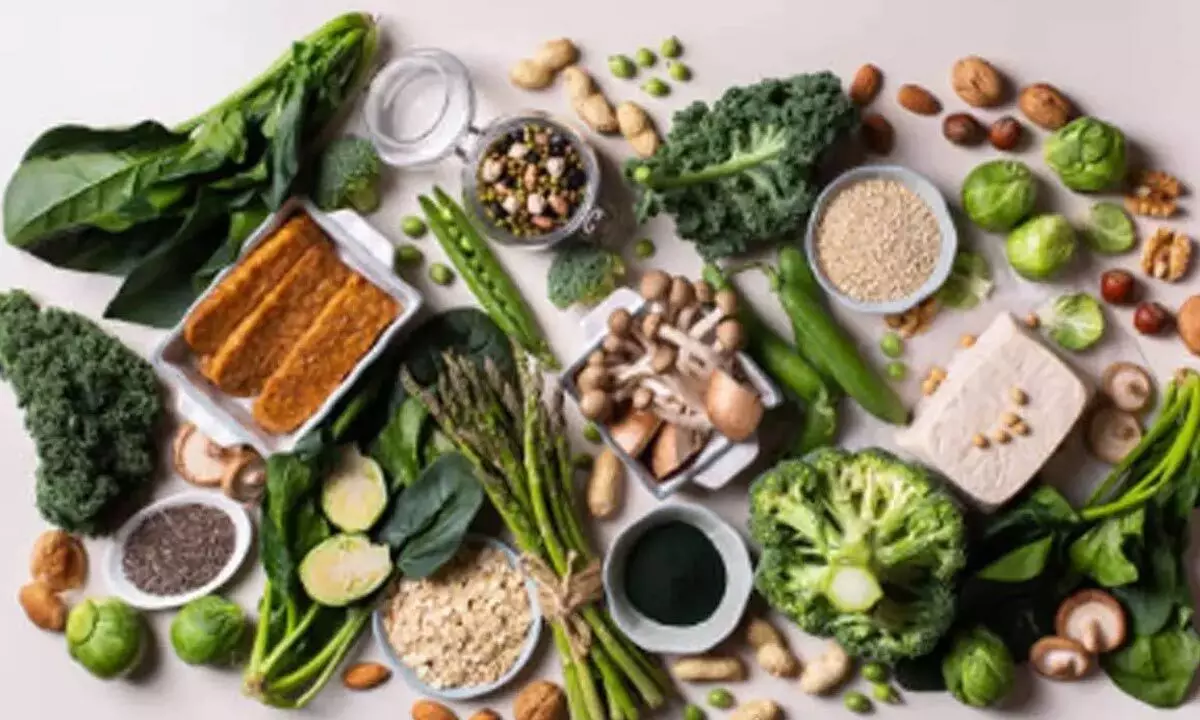Live
- Celebrating the power of thought
- President Droupadi Murmu Arrives in Hyderabad to Attend Koti Deepotsavam
- Border-Gavaskar Trophy 2024-25: Rohit Sharma to join Indian team midway of Perth Test, set to be available from second Ind vs Aus Test
- Scholarships For Students
- EFLU hosts talk on 75 years of the Indian Constitution
- Mohan Babu: Half a Century of Cinematic Brilliance and Unwavering Legacy
- Chandrababu Vows Strict Measures for Women's Safety and Drug Control
- Deputy CM Bhatti Vikramarka Highlights Congress Government's Achievements
- PCC Expansive Meeting Held at Gandhi Bhavan in Hyderabad
- Formula 1: I didn't really want to come back after Brazilian GP, admits Hamilton
Just In
Plant-Based Protein Alternatives for Vegan Athletes


In the world of fitness and bodybuilding, protein intake is a crucial aspect of diet and nutrition. For vegan athletes, the challenge lies in ensuring they get sufficient protein from plant-based sources.
In the world of fitness and bodybuilding, protein intake is a crucial aspect of diet and nutrition. For vegan athletes, the challenge lies in ensuring they get sufficient protein from plant-based sources. The good news is that plant-based proteins can be just as effective as animal-based proteins, provided they are consumed correctly and combined appropriately.
Understanding Amino Acids: The Building Blocks of Protein
Proteins are made up of amino acids, which are essential for muscle repair, growth, and overall body function. There used to be a concept of labeling protein sources as "complete" or "incomplete," often referred to as first-class and second-class proteins. However, this distinction is somewhat misleading because almost every source of dietary protein contains all the essential amino acids. The key is that some foods are lower in certain amino acids than others, but this can be mitigated by combining different foods to create a complete amino acid profile.
Contrary to popular belief, you do not need to combine foods at each meal to get a complete protein. The body has an amino acid pool—a certain amount of amino acids floating freely in the bloodstream—that it can draw from as needed. The exception is leucine, a critical amino acid for muscle protein synthesis, where athletes need to ensure they are hitting the 2-3 grams per meal threshold, which is achievable on a plant-based diet.
Debunking the Myths: Protein Quality and Bioavailability
A common myth is that plant proteins are of lower quality and bioavailability compared to animal proteins. While this might be true for some plant foods, it's not a universal rule. Many plant-based foods provide high-quality protein, and when combined, can meet all the body's amino acid needs. For example, combining rice and peas or grains and legumes can achieve a protein quality score comparable to that of animal proteins.
The Role of Supplements
In the age of supplements, the debate often centers around the effectiveness of a diet without supplements versus one with them. For vegan athletes, supplements can play a crucial role in meeting protein requirements without exceeding caloric intake from carbohydrates and fats. Plant-based protein powders such as soy protein isolate, pea protein, and rice protein have shown to be effective alternatives to whey and casein.
Studies have demonstrated that pea protein can even outperform whey in increasing muscle thickness. This makes pea protein a valuable option for those looking to avoid animal products while still maximizing their muscle gains. Similarly, rice protein, when combined with pea protein, can provide an amino acid profile that rivals that of whey protein.
Addressing Nutrient Gaps and Anti-Nutrients
One concern with plant-based diets is the potential absence of certain zoonutrients—nutrients found in animal products that might not be as prevalent in plant foods. Additionally, anti-nutrients present in some plant foods can interfere with nutrient absorption. However, these issues are often overstated. Modern food processing techniques significantly reduce the levels of anti-nutrients in plant-based protein supplements, making them a viable option for athletes.
The Bigger Picture: Diet as a Whole
Instead of focusing solely on the protein quality of individual foods, it's more practical to consider the diet as a whole. By consuming a variety of plant-based foods, athletes can ensure they get all the essential amino acids in the right amounts. While high-calorie diets might require protein supplementation, the availability of plant-based protein powders makes this a manageable task.
Popular Plant-Based Protein Supplements
There are several plant-based protein supplements available in the market today. Some of the popular ones include:
● Soy Protein Isolate: A highly refined form of soy protein that is low in anti-nutrients and high in protein content.
● Pea Protein Isolate: Known for its high quality and effectiveness in muscle building, pea protein is a top choice for many vegan athletes.
● Rice Protein: When combined with pea protein, it provides a complete amino acid profile similar to whey.
These supplements are not only effective but also widely available, making it easier for vegan athletes to meet their protein needs without compromising on their dietary principles.
Plant-based protein alternatives can be just as effective as animal-based proteins for vegan athletes. By understanding amino acid profiles, leveraging supplements, and considering the diet as a whole, athletes can achieve their fitness goals without relying on animal products. The key lies in making informed choices and combining different plant foods to ensure a complete and balanced intake of essential amino acids. As more research supports the efficacy of plant-based proteins, the options for vegan athletes continue to expand, making it easier than ever to maintain a strong and healthy physique on a plant-based diet.
(Scientific Author and Fitness Coach)

© 2024 Hyderabad Media House Limited/The Hans India. All rights reserved. Powered by hocalwire.com






